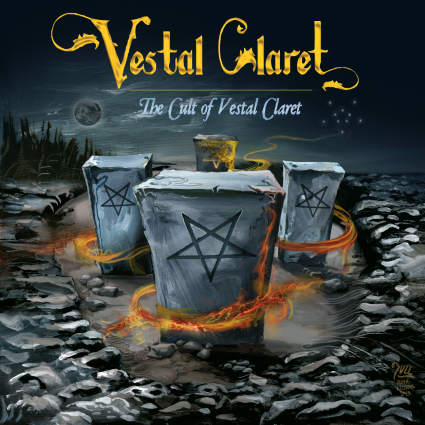
Album Review: Vestal Claret - The Cult Of Vestal Claret
Doom metal has always been an underground scene, but even in doom there are levels of complete anonymity. While bands like Pentagram, Saint Vitus, and Candlemass managed to make their names known, even if their audiences were always small, the vast majority of doom bands never make it any further than the devoted fans of the genre. Vestal Claret, to this point, has been one of those doom bands that you would never have heard of unless you were deeply entrenched in the doom scene. There is something to be said for remaining in the shadows so long, having the ability to hone and develop your sound without the pressures that come along with success. It can work to a band's benefit to have their earliest efforts shrouded by limited releases.
“The Cult Of Vestal Claret” is the band's first release that could find that wider audience, which makes it all the more confusing to me that the majority of the record is made up of songs that have previously been released. Perhaps the band thinks this is putting their best foot forward, but tracking backward is a dangerous play. It's not often that a band's best songs would have been written and released long before they got their shot to break out.
Vestal Claret, thankfully, plays a variety of doom that contains heavy doses of more traditional metal. These songs are not the kind that drone a single, glacial riff until the weight of boredom becomes suffocating. Rather, they take cues from bands like Trouble, who managed to bring the sound of doom to slightly more energetic songs, playing a hybrid style that has more going for it than sheer heaviness. “The Cult Of Vestal Claret” features plenty of spiraling guitar riffs that wouldn't sound out of place on a Manilla Road album, a band that makes for a fair comparison. Like those legends, Vestal Claret marries nasal vocals to a plodding brand of traditional metal that seems to exist out of time.
The band's direction has plenty of good decisions behind it, but there are issues as well. First, there's the band's dedication to “abundant references to Occultism, Satanism and other disturbing imagery.” Frankly, that schtick is tired and played out, and unless you can do it better than the rest, it's a recipe for being written-off in my book. These songs don't bring anything interesting to the table in terms of their lyrical skills, neither incorporating a fresh angle, nor any particularly memorable images that do what the band intended. If this is the route they want to go, they need to pay the toll and travel to the end of the road. They didn't go far enough to differentiate themselves from every other band that writes songs about witches and devils.
The other problem with the album is that the songs aren't up to the level they need to be. While there are some nice guitar riffs in the songs, the compositions themselves lack the driving force they need. The songs rely on riffs, but they aren't the monolithic earworms that Tony Iommi laid the blueprint for, and the vocals don't add the melody the songs need. If they want to haunt me, they need to endure in my head after I've listened to them, which these songs don't do. A song like “The Demon And The Deceiver” is five minutes of softly droning guitars, and a vocal that seems as bored as I was.
I get what Vestal Claret is trying to do, and there's real potential for the sound they were aiming for. But by pulling out a bunch of old songs, they aren't letting the band develop into their identity, instead remaining stuck in their nascent days. I'd like to think that bands get better as songwriters as they make their way through their releases, and instead of showing that off, Vestal Claret has given us their growing pains to listen to. It's mildly interesting, but it's not enough to judge if there's a reason to look forward to what they do next.

